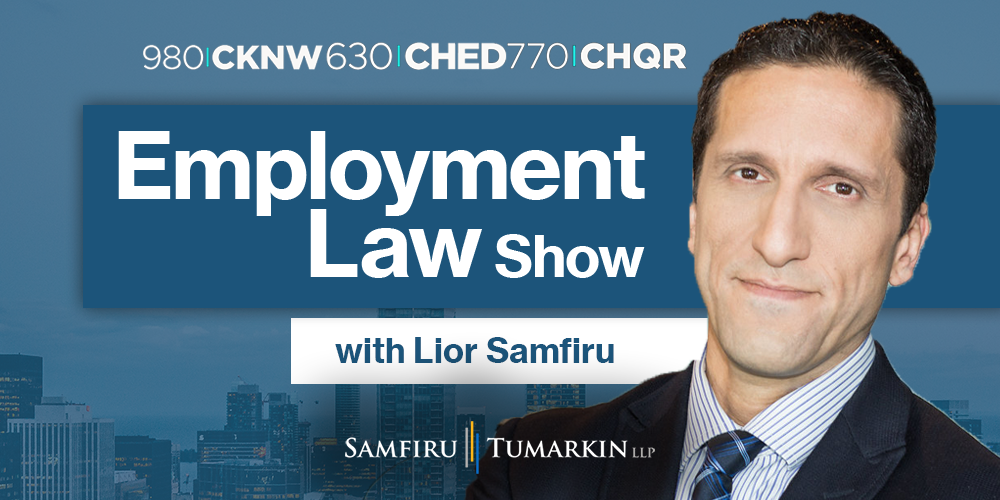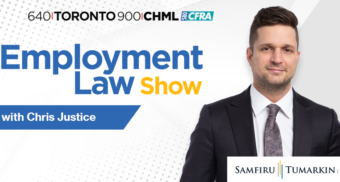Employment Law Show 980 CKNW – S5 E7

Episode Summary
Independent contractors, constructive dismissal, probation periods, and more on Season 5 Episode 7 of the Employment Law Show on Global News Radio 980 CKNW in Vancouver.
Listen below as a Vancouver employment lawyer at Samfiru Tumarkin LLP reveals your workplace rights in British Columbia on the Employment Law Show. They shatter myths and misconceptions about severance pay, terminations, workplace harassment, overtime pay, wrongful dismissal, constructive dismissal, duty to accommodate, and more.
Listen to the Episode
Episode Notes
I’ve been employed for 10 years as an office manager. There has been some restructuring and I was told it would be better for me if I resigned. What should I do?
Employees should not resign if pushed to do so by their employer. By resigning, employees are giving up their rights to their full severance entitlements. Resignations have to be voluntary and if forced to resign, employees are considered to be terminated.
Uber drivers in the U.K were officially classified as employees. What does this mean for the company globally?
Samfiru Tumarkin LLP is currently heading a class-action lawsuit against Uber Canada to classify Uber drivers as employees. Many employees are wrongfully classified as independent contractors when they are in fact employees. The gig economy has effectively changed what an employee can be and puts into question the level of control an individual has who is classified as an independent contractor.
I’m an Uber and Lyft driver. Am I an employee of both companies?
It is possible for a driver to be an employee of both companies, as at times employees can have several part-time jobs. Ultimately, it will depend on the level of control a driver has over their ability to work.
Should you call an employment lawyer if you’ve been fired?
Many employees are unaware that the reason for termination often does not matter when they are terminated. Most employees are wrongfully dismissed as they are not offered adequate severance. In order to pursue proper compensation, employees need to contact an employment lawyer.
Do you need an employment lawyer if you receive bad performance reviews?
Employees who are receiving reviews from their employer which they feel are inaccurate should communicate with their employer their concerns and whether or not they agree with the criticism. Often employers attempt to build a case against an employer in order to possibly terminate an employee for cause. Building a case can entail bad performance reviews and a performance improvement plan.
Should you call an employment lawyer if you are given a document to sign?
Employees should be wary of signing any documentation given by an employer after already beginning employment. While in most cases it is an employment agreement, some employers might offer documentation regarding a promotion or raise that contains possible limitations to severance and other rights. Before signing any documentation an employee should seek out legal advice.
I started a new job and towards the end of my probation, I had to quarantine due to exposure to a family member with COVID-19. I was then terminated and not offered severance. What are my options?
Employees who are not given an employment contract that stipulates a probationary period should remember that employers cannot assume the first few months of employment are probationary. Probation periods are not automatic and have to be agreed upon by an employee. Employees who are terminated without cause are entitled to full severance. The standard for terminating an employee on a probationary period is also typically higher than regular termination.
Can my employer change the terms of my employment due to COVID-19?
Learn More
Constructive Dismissal
Employees need to ensure if they have agreed to change the terms of their employment, that the acceptance is only for a temporary period of time. By agreeing to changes of employment without further stipulations, gives an employer permission to implement changes in the future. Employers are not permitted to change the terms of employment significantly without an employee’s consent.




